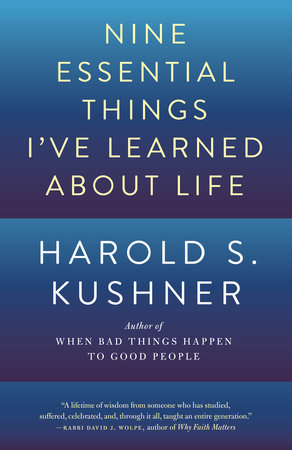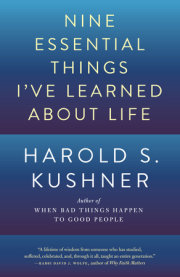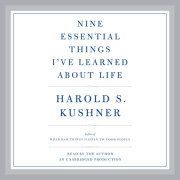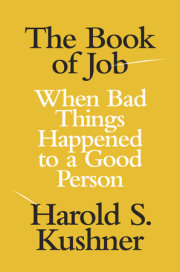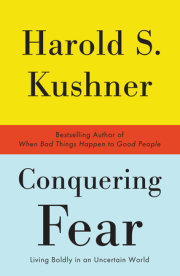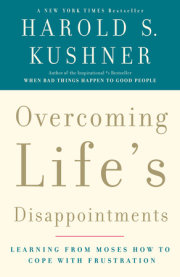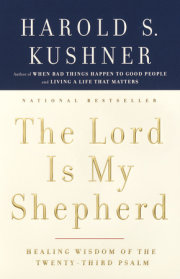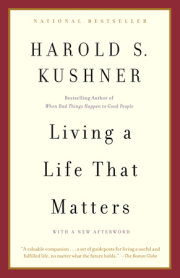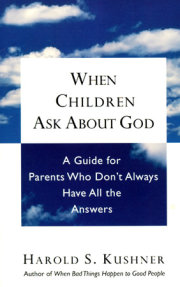Chapter One
Lessons Learned Along the Way
In the twenty-first century, the religious agenda will be set not by tradition’s answers but by congregants’ questions. For thirty years, I had the perfect job. I was a congregational rabbi. I studied, I taught, I officiated at life-cycle events—bar mitzvah services, weddings, and funerals—trying to enhance the joy and mitigate the sorrow of those moments with my words and with elements of the Jewish tradition, all things I had been taught to do and felt good about doing. (I confess there was one other aspect of being a congregational rabbi that pleased me. I have read that the most frightening thing a person can contemplate, even more than the fear of death, is the fear of having to speak in public. That’s not me. In a room where two hundred people are sitting and listening and one person is standing and speaking, I will always be most comfortable being the one standing and speaking.)
I’m not sure how I ended up being a rabbi. It was never my intention growing up. I don’t think it ever occurred to me, nor to my parents, who suggested regularly that they would like me to be a doctor. I entered college with no idea of what I would do professionally, hoping that college would give me a direction. My father was a successful businessman, which ruled that out as a career. I did not want to go into business and fail, disappointing my father, nor did I want to go into business and be more successful than my father (a highly unlikely outcome). I have known families in which that engendered not pride but resentment.
I entered Columbia in 1951, listing my major as “liberal arts,” which left open all possibilities short of medical school. I also took advantage of Columbia’s proximity to the Jewish Theological Seminary, where my mother had studied to be a Hebrew teacher some twenty-five years earlier and where some of her most revered teachers still taught. The Seminary offered evening classes for students who wanted the education without seeking a career in Jewish professional life.
In those evening classes, I came to recognize four or five familiar faces from my freshman classes at Columbia, and we bonded. We would come back from class and stay up late talking theology, trying to make sense of the Holocaust, details of which had just become widely known, and discussing what the State of Israel, founded just a few years earlier, would mean for Jewish life. Several of those friends were planning to study for the rabbinate, though none of them did. Only I ended up there. After graduating from Columbia in 1955, I enrolled in the Seminary’s rabbinical school and emerged five years later as a Conservative rabbi.
My spiritual life—what I believe, teach, and practice—has been shaped in large measure by two sets of circumstances. The first was the home I grew up in and the synagogue my family and I attended. The rabbi at the Brooklyn Jewish Center was Israel Levinthal, recognized as one of the outstanding preachers of the American Jewish community. Stories circulated of how Orthodox Jews would walk over the Williamsburg Bridge from the Lower East Side to Brooklyn on Friday nights (as they could not take trains on the Sabbath) to hear Levinthal speak. The quip was that every newly ordained Conservative rabbi would head out to his first pulpit with two books in his luggage: the pocket guide to Jewish practice and the collected sermons of Israel Levinthal. To this day, I cannot sit down to write a sermon without feeling Rabbi Levinthal’s presence looking over my shoulder to make sure I am being faithful to the text.
I would describe the religion practiced in my home as “observant but not compulsive.” When we lit the Sabbath candles on a Friday night or observed the traditional dietary rules about permitted and forbidden foods, I never had the sense that we were obeying a command from a God who would be displeased with us if we had not done those things, nor did we obsess about the consequences of our inadvertently making a mistake. Rather, we felt we were making a statement about who we were as a family and, although I don’t think the word would have occurred to any of us, we were bringing a measure of holiness into an ordinary middle-class home, turning mundane moments into appointments with God. I could not have predicted at the time that the concept of “observant but not compulsive” and the absence of a belief in a God who would punish us for disobedience would go on to become cornerstones of my personal and professional life.
The second circumstance that shaped my religious outlook was the illness and death of our son, Aaron, from one of the world’s rarest diseases, progeria, the “rapid-aging” syndrome, as I chronicled in my book
When Bad Things Happen to Good People. It was in the presence of my sick and dying child that I discovered how inadequate the traditional perspective was that I had grown up with and had been taught, that God has His reasons, which we cannot comprehend or judge. It neither made sense of the suffering nor offered us much in the way of comfort. If I was to continue to serve as a rabbi and to honor my son’s memory, I would have
to find a better explanation.
I think of the first circumstance, the religion of my childhood home and synagogue, as “religion done well,” religion fashioning a community and introducing moments of specialness into an ordinary home. And I think of the second as my encounter with “religion done badly,” more concerned with protecting God’s reputation than with helping worshippers in need. The notion that an all-wise, all-powerful God who is totally good must have had His reasons for inflicting incurable illness on innocent children, reasons beyond the comprehension of a human mind or soul, was worse than unhelpful. It was offensive, saying to us either “You must have done something to deserve this” or “In times to come, you will understand why this was the right thing to happen to you.” I heard this from many people after my book came out: “Now you know why God did this to your child, so that you would write this book that would help millions.” I’m sorry, but I choose to believe that any God worth worshipping would say, “I really don’t need you to be My press agent. I need you to bring solace and comfort to My bleeding children on earth.”
More than anything else, my half century of congregational service and my dozen or so books have been dedicated to reformulating that traditional theology. I’ve done this not to protect God from bad theologians and people’s righteous anger, but to rescue people who need God from having to choose between a cruel God and no God at all.
I heard a story some years ago about a couple celebrating their twentieth wedding anniversary by going out to dinner at a fancy restaurant. Leaving the restaurant, they got into their car to drive home. The wife turned to the husband and said, “What’s happened to us over the years? Do you remember when we were courting, when we were first married, how we would get into the car and snuggle up close to each other, and drive somewhere holding on to each other? Now look how far apart we’re sitting.” And the husband responded by pointing to the steering wheel and saying, “I haven’t moved.”
For many of us, there was a time when we were young when we felt close to God. We had been taught that God loved us and was watching over us, and that made us feel safe. We tried to be worthy of God’s love and were troubled by guilt every time we told a lie or took something that didn’t belong to us. When we learned of other people’s suffering, as when my best friend died of a brain tumor when he was ten years old, we fell back on the assumption that God knows what is best for us better than we do. That childhood faith did not last. War, crime, serious illnesses affecting people we cared about, the emerging truth about the Holocaust, and the inevitable disappointments of life cost us that simple faith of our childhood, and like the wife in the story, we found ourselves feeling distant from the God to whom we had once felt so close but now found unreliable. I hope that this book, born out of my own struggles with faith lost and recovered, will help to close that gap, to let us know that God has not moved but that we have come to see Him more clearly.
My years at rabbinical school were an extraordinary intellectual feast. For four years (plus a year of independent study in Israel), I was confronted on a daily, if not hourly, basis by great minds, great scholars, men who dominated (and in some cases had created) their areas of expertise. I had the privilege three times a week of watching the mind of Saul Lieberman analyze a puzzling page of the Talmud. I was introduced to a new level of biblical scholarship, at once critical and reverent. And I met the man who would change my life, Mordecai Kaplan. Where my other professors had answers to text-related questions, Professor Kaplan had questions to challenge the answers we brought to class. He accomplished the Copernican revolution of moving the center of gravity in religion from divinely ordained observances to the collective will of the community. Judaism was what serious Jews did, not what books described them as doing. Christianity would be defined by how Christians acted today, not by what medieval scholars wrote long ago. In the process of teaching me, he prepared me for the crisis that would arise from the one serious flaw in my otherwise excellent rabbinic education. More about that later.
I was ordained a rabbi in June 1960. We graduates were expected to give two years of service before we began our careers, in some position that would otherwise not be able to have a rabbi: a small congregation, an organization serving the less fortunate, or the military chaplaincy. I made myself available to the chaplaincy. This country had been very good to my family, welcoming my parents when they immigrated from Lithuania, educating my brother and me, sending an army to defeat the Nazis before they could finish the destruction of European Jewry, and I felt I owed it something for that. As a clergyman, I was exempt from the draft, so I had to go to court and have the exemption waived. I was commissioned a first lieutenant and, with my new bride of a few months, headed out to Fort Sill in Lawton, Oklahoma.
It was in many ways a good experience. I had time to study. Every Monday, I would meet for lunch with the post psychiatrist, who was a member of my congregation there. He taught me how to understand and respond to the problems the GIs brought to me on a daily basis. And as a colleague of mine put it, as a new rabbi I got to make my rookie mistakes on congregants who did not have the power to fire me.
I completed my two-year obligation, served a four-year apprenticeship in a major Long Island synagogue, and in the summer of 1966 assumed the pulpit of Temple Israel in the Boston suburb of Natick. Soon enough, I discovered the strengths and the weaknesses of my seminary training.
After years of intensive study of classical texts, I left school full of answers. The implicit message of my rabbinical school was: “These answers are the essence of Judaism. If your congregants ask you questions to which these answers don’t fit, educate them to ask more appropriate questions.” Some of that worked. The meaning and emotional impact of the customs and usages of traditional Judaism can be magical, and I trust this holds true for other religions as well. Done right, they can transform a moment from ordinary to sublime. A wedding ceremony can be elevated from a mundane legal procedure to a celebration of the miracle of love and commitment, a human being entrusting his or her happiness to the care of another human being, giving parents and grandparents a glimpse into the promise of vicarious immortality. A bar mitzvah service done right (how often does that happen?) can be more than an elaborate birthday party. It can celebrate a child’s crossing the threshold, being publicly recognized as an incipient adult, capable of mastering the skills required of adults in his community. A funeral is not simply the disposal of a dead body. It represents the gathering of the community to provide comfort to the bereaved in time-honored, time-tested ways, so that the mourner need not feel abandoned at a time when he or she is most prone to feeling abandoned.
Congregants did come to me with questions, but most of their questions were not the ones my seminary training had prepared me for. I knew which prayers are recited at the Sabbath service, but I had no ready answer for the congregant who said to me, “Saturday is the busiest day in my business. That’s when I make most of the money to pay the bills at home. What right do you have to tell me to skip work and come to services instead?” Or the parents who said to me, “Little League baseball is the most important thing in our eleven-year-old son’s life right now. If the temple makes Junior Congregation mandatory, we’ll pull him out of Hebrew school before we take him out of Little League.” (My answer: we’ll see him in Junior Congregation when Little League season ends.)
My Seminary education made me an authority on the Jewish dietary laws. I had a three-page printout of which fish had fins and scales and could be eaten by observant Jews, and which fish lacked them and were nonkosher. But I was rarely asked about that. I was more likely to be asked, “Why do I have to restrict what I serve my family today based on which foods were not good to eat in the heat of the Sinai desert?”
Those encounters taught me the first rule of religious life in the twenty-first century and what made it different from religious life in previous times. The agenda for religion today will be set not by yesterday’s answers but by today’s questions. I still believe there is great wisdom in yesterday’s answers. Human nature has not changed that much. But my rabbinic education, splendid as it was, saw congregants as passive consumers of ancient and eternal truths. To be religious was to obey, not necessarily to understand, and certainly not to question. That perspective did not prepare me for a world in which the meaning of words like “commitment,” the structure of the family, issues of religious identity in an open society, and the respective roles of men and women were in flux. Those changes set in motion major changes in the way Jews and Christians alike responded to their respective religious traditions. Sociologists have identified the salient difference between working-class and middle-class people as a function of how much control someone has over his or her life. Working-class people, as well as women in premodern times, were accustomed to following orders, deferring to authority. By contrast, middle-class and upper-class people understand that it is not their obedience but their judgment that people look to them for. They feel they have not only the right but the obligation to question the way things have always been done. Citing a verse from Leviticus to justify the exclusion of gays or pointing to a thousand years of precedent to undergird priestly celibacy is no longer a persuasive argument.
My job as a rabbi was neither simply to perform nor to inform, but to transform. Sometimes that meant trying to change the behavior of a congregant to embrace time-tested values, and sometimes it meant changing the observance, peeling away its ancient outer shell so that the message at its core could more easily emerge. Arthur Hertzberg, a historian, posited a theory as to why American Jewish immigrants were so ready to dispense with practices that had been part of Jewish life for centuries. He asked: “During the great waves of immigration from Eastern Europe between 1881 and 1924, which East European Jews were most likely to emigrate and which ones were more likely to stay behind?” For the most part, he speculated, it was the young, the more ambitious, the ones for whom Jewish life in Europe had less to offer who boarded the ships. The more learned, the rabbis and scholars, were more likely to stay behind. As a result, we ended up with a large Jewish population with a strong sense of Jewish identity but few religious leaders and very little serious knowledge of the history and reasons for what Jews traditionally did. For them, Jewish life was a mix of vaguely remembered holiday customs and Polish superstitions. The message they passed on to their children was “This is what Jews do. Don’t ask me why, or what it means. We just do it.”
My job called on me to listen carefully to what my congregants were saying, sometimes to pierce the veil of anger or mockery in which they phrased their questions, and to try to hear the faint echo of a soul yearning for a meaningful relationship to God if it could be presented to them in terms that they could intellectually and morally respect. The woman who could not see the need to mourn for her recently deceased unloved father, a man who had left his wife and ignored his children, was not really telling me that she had no need to grieve. She was saying, whether she realized it or not, that mourning for the man who had given her life and then rejected her was going to be a complicated process and she didn’t know where to start. She had strong but confused feelings, and she was asking for my help in sorting those feelings out, even if she didn’t understand that that was what she was doing. I would have betrayed the trust of congregants who informed me that they would not mourn their father because they were not religiously inclined had I not warned them that this was not just a matter of obeying or ignoring the rules of Judaism. You cannot shrug off the loss of a parent the way you can shrug off the loss of a movie you never got around to seeing. It was my duty to warn them not that God would think less of them if they broke one of Judaism’s rules, but that those rules were forged by human beings who understood the human soul, and that every hour they saved this week by not formally grieving they would pay back with interest in a therapist’s office.
Measured by the scale I have discussed here, the congregants in my synagogue come in three flavors. There are those, may God bless them and may their tribe increase, who love their religion and can’t get enough of it. They take classes, attend services, staff committees, volunteer to bring meals to shut-ins, and are always looking for ways to make things better. They do it not in the expectation that God will think more kindly of them but because they like themselves better when they do those things. Then there are those who show up only for major services and the occasional family bar mitzvah. (I wonder if there is any other aspect of their lives where they ask how little they can get for what it costs.) But perhaps the most interesting ones are the people who challenge me, not as a kind of game (“let’s see if we can stump the rabbi”) but out of a genuine willingness to learn. They have found that religion as it has been presented to them throughout their lives is unworthy of either their intellectual respect or their emotional attachment. Their implicit deal with me is that they will take their religion more seriously if I can show them not how old and time-tested it is but where it can answer their most profound questions, questions about relationships, about life’s unfairness, about right and wrong, about revenge and forgiveness, and about the meaning and purpose of their lives. Nobody at school told me that this would be my challenge, but hardly a day has passed since then without my confronting it. That was the flaw in my rabbinic education. When I was ordained a rabbi at age twenty-five, they told me I was ready to go forth and teach. The truth was, I was at best ready to go forth and learn.
Copyright © 2015 by Harold S. Kushner. All rights reserved. No part of this excerpt may be reproduced or reprinted without permission in writing from the publisher.

